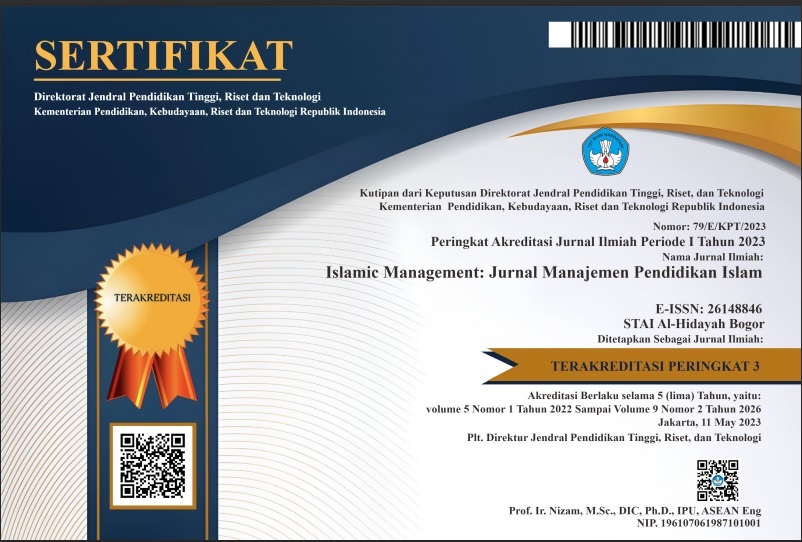Islamic Worldview Syed Muhammad Naquib Al-Attas dan Implikasinya Terhadap Paradigma Pendidikan Islam
DOI:
https://doi.org/10.30868/im.v7i01.7277Keywords:
Worldview, Naquib Al-Attas, Paradigm, Islamic EducationAbstract
Penelitian ini bertujuan untuk mengeksplorasi worldview Islam menurut Syed Muhammad Naquib al-Attas dan implikasinya terhadap paradigma pendidikan Islam. Al-Attas mengemukakan bahwa worldview Islam berlandaskan prinsip tauhid yang menyatukan berbagai aspek pengetahuan, mengakui wahyu sebagai fondasi utama sebelum rasio, empiris, dan intuisi. Penelitian ini mengkaji karakteristik worldview Islam menurut al-Attas, termasuk pengakuan terhadap realitas metafisis yang mencakup dunia nyata dan dunia gaib, serta upaya untuk menghindari dikotomi antara pengetahuan ilmiah dan spiritual. Implikasi worldview ini terhadap pendidikan Islam dianalisis dalam konteks integrasi nilai-nilai spiritual dan etika yang berasal dari wahyu, harmonisasi antara pengetahuan ilmiah dan keyakinan religius, serta penekanan pada perkembangan moral dan spiritual. Penelitian ini juga membahas bagaimana paradigma pendidikan Islam harus selaras dengan prinsip tauhid, mengarahkan individu pada pengenalan dan pengakuan terhadap posisi Tuhan dalam eksistensi, serta memastikan bahwa ilmu pengetahuan dan teknologi terhubung dengan nilai-nilai Islam. Dengan pendekatan komprehensif dan integratif, penelitian ini memberikan pemahaman mendalam tentang bagaimana worldview Islam al-Attas membentuk dan memengaruhi paradigma pendidikan Islam, serta bagaimana pendidikan dapat mencerminkan dan menerapkan prinsip-prinsip tauhid dalam praktek.
References
Al-Attas, S. M. N. (2023). The Concept Education In Islam: A Framework for an Islamic Philosophy of Education, 6th ed. Kuala Lumpur: Ta’dib International.
Al-Attas. S. M. N. (2011). Islam Dan Sekularisme, Terj. Khalif Muammar. Bandung: Mizan.
Al-Attas, S. M. N. (1995). Islam Dan Filsafat Sains, Terj. Syaiful Muzani. Bandung: Mizan, 1995.
Aly, H. N., Abdullah, S., Chamami, M. R., Fihris, Yahiji, K., Supiah, Damopolii, M., Ainiyah, N., & Ritonga, A. R. (2023). Reviewing the Colonial Period Islamic Education System in Indonesia: What is Still Relevant to Continue. Journal of Namibian Studies, 33, 671–687. https://doi.org/10.59670/jns.v33i.531
Aly, N. Hery, & Munzier H.S. (2000). Watak Pendidikan Islam. Jakarta: Friska Agung Insani.
Anggito, Albi & Johan Setiawan. (2018). Metodologi Penelitian Kualitatif. Jawa Barat: CV Jejak.
Dalimunthe, M. A., Pallathadka, H., Muda, I., Devi Manoharmayum, D., Habib Shah, A., Alekseevna Prodanova, N., Elmirzayevich Mamarajabov, M., & Singer, N. (2023). Challenges of Islamic education in the new era of information and communication technologies. HTS Teologiese Studies / Theological Studies, 79(1). https://doi.org/10.4102/hts.v79i1.8608
Dalimunthe, M.A. (2022). Keterampilan Komunikasi Antarbudaya Mahasiswa Malaysia di Kota Medan. Langgas: Jurnal Studi Pembangunan 1 (2), 82-89
Dimyati, Johni, (2013). Metodologi Penelitian Pendidian & Aplikasinya pada Pendidikan Anak Usia Dini. Jakarta: Kencana Prenamedia Group.
Hadi, Sutrisno. (1995). Metodologi Research, Jilid III. Yogyakarta: Andi.
Hossein, N. S. (2021). Antara Tuhan, Manusia, Dan Alam. Edited by Ali Noer Zaman. Yogyakarta: IRCiSoD.
Indainanto, Y. I., Dalimunthe, M. A., Sazali, H., Rubino, & Kholil, S. (2023). Islamic Communication in Voicing Religious Moderation as an Effort to Prevent Conflicts of Differences in Beliefs. Pharos Journal of Theology, 104(4). https://doi.org/10.46222/pharosjot.104.415
Irwan., Desnelita, Y., Susanti, W., Rizal, F., & Ritonga, A. R. (2023). The Implementation of Collaborative Project Based Learning Model with Inquiry Process using E-Learning in Higher Education. Educational Administration Theory and Practice, 29(1), 90–101. Available at: 10.48047/rigeo.11.09.187
Ismail. (2001). Paradigma Pendidikan Islam. Edited by ed. Yogyakarta: Pustaka Pelajar.
Makkreel, R.A. (2022). Kant’s Worldview: How Judgment Shapes Human Comprehension. Evanston: Northwestern University Press.
Mailin, M., Dalimunthe, M.A. & Zein, A. (2023). Exploring Intercultural Communication in Indonesia: Cultural Values, Challenges, and Strategies. Journal of Namibian Studies: History Politics Culture 33, 2804-2816.
Ritonga, A.R., Frimansyah., Zein, A., Syam, A.M., Ohorella, N.R. (2024). Misconceptions of Jihad: A Constructivist Review of the Meaning of Struggle in Islam in the Modern Era: Analysis of the verses al-Amwaal wa al-Nafs. Pharos Journal of Theology. 105(1), pp. 1–13. Available at: https://doi.org/10.46222/pharosjot.1053
Ritonga AR, Veronica A, Ginting LDCU, et al. (2024). Library Promotion In The Development Of The Universitas Sumatera Utara Towards A World-Class University. Journal of Infrastructure, Policy and Development. 8(6): 4149. https://doi.org/10.24294/jipd.v8i6.4149
Rubino, R., Ritonga, A.R., Madya, E.B. & Ritonga, H.J. (2023).The Ethics of the Apostle Da'wah in the Qur'an and its Application in Social Media. Pharos Journal of Theology, 104(2).https://www.pharosjot.com/uploads/7/1/6/3/7163688/article_10_vol_104_2__indonesia_correct.pdf
Siddiq, Umar dan Choiri, M. (2018). Metode Penelitian Kualitatif di Bidang Pendidikan, Ponorogo: CV. Nata Karya.
Sikumbang, A. T., Dalimunthe, M. A., Kholil, S., & Nasution, N. F. Digital Da'wah Indonesia Ulema in the Discourse of Theology. Pharos Journal of Theology. 105(1). 1-14. https://doi.org/10.46222/pharosjot.1051
Wall, T. (2001). Thinking Critically About Philosophical Problem, A Modern Introduction, Wadsworth. Australia: Thomson Learning
Zarkasyi, H. F. (2013). Worldview Islam dan Kapitalisme Barat”, Tsaqafah. Jurnal Institut Studi Islam Darussalam Gontor, vol. 9, No. 1, (Indonesia: ISID, 2013), 19.
Downloads
Published
How to Cite
Issue
Section
Citation Check
License

This work is licensed under a Creative Commons Attribution-ShareAlike 4.0 International License.
Authors who publish with this journal agree to the following terms:
- Authors retain copyright and grant the journal right of first publication with the work simultaneously licensed under a Creative Commons Attribution License that allows others to share the work with an acknowledgment of the work's authorship and initial publication in this journal.
- Authors are able to enter into separate, additional contractual arrangements for the non-exclusive distribution of the journal's published version of the work (e.g., post it to an institutional repository or publish it in a book), with an acknowledgment of its initial publication in this journal.
- Authors are permitted and encouraged to post their work online (e.g., in institutional repositories or on their website) prior to and during the submission process, as it can lead to productive exchanges, as well as earlier and greater citation of published work (See The Effect of Open Access).






